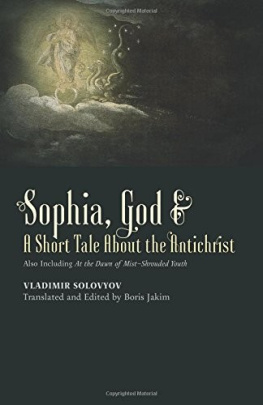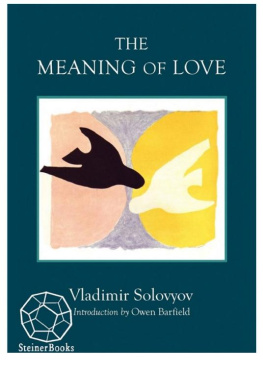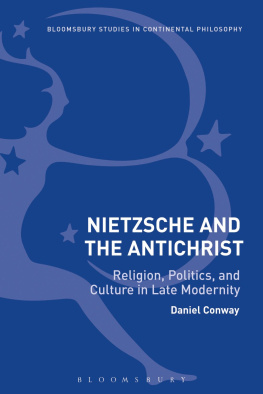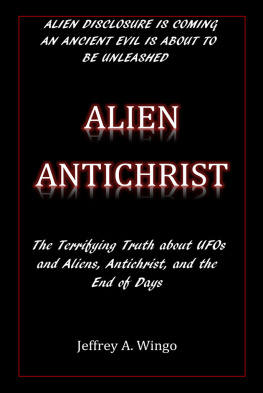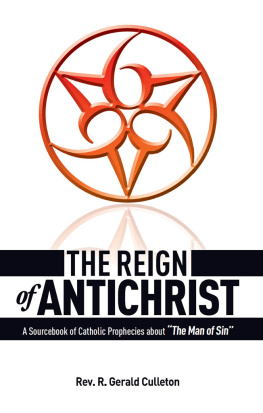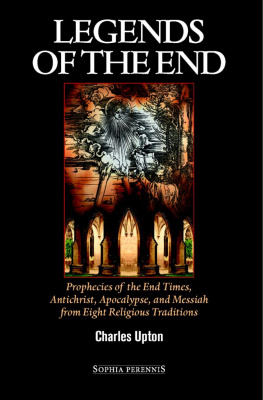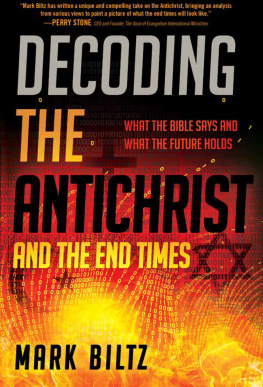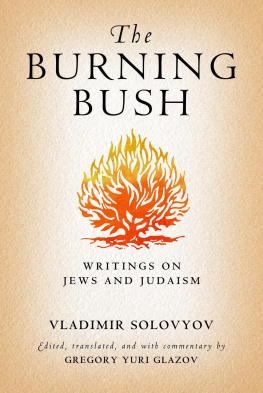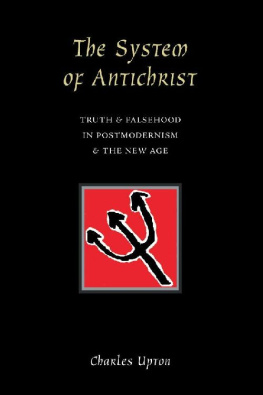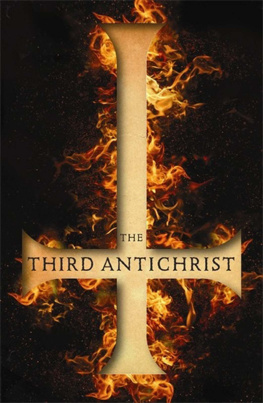vladimir solovyov
sophia, god
&
a short tale about
the antichrist
Also Including
At the Dawn of Mist-Shrouded Youth
Translated and Edited
by
boris jakim
SEMANTRON PRESS
First published in the USA
by Semantron Press
an imprint of Angelico Press 2014
Boris Jakim 2014
All rights reserved
No part of this book may be reproduced or transmitted, in any form or by any means, without permission.
For information, address:
Angelico Press, Ltd.
4709 Briar Knoll Dr. Kettering, OH 45429
www.angelicopress.com
Paperback: 978-1-62138-095-5
Cover image: Diego Velzquez,
St. John on Patmos (detail), 16191620
Cover design: Michael Schrauzer
xi
C O N T E N T S
Editors Note............................... i A Short Tale About the Antichrist.............. 1
At the Dawn of Mist-Shrouded Youth........... 43
SelectedLetters to Ekaterina Romanova......... 71
Three Meetings............................. 101
The Concept of God ( In Defense of
Spinozas Philosophy) ...................... 113
Editors Note
This volume contains several late works of Solovyov, representing his final speculations about matters crucial to the final destiny of humanity and the world. As Solovyovs life was coming to an end with the end of the 19th century, his thoughts were directed at three things: the end of the world (the Antichrist), the beauty and wisdom of the world (Sophia), and the nature of God. These works can be said to represent his last discourse.
The translation of The Short Tale about the Antichrist is new and has a new Translators Introduction. The translations of At the Dawn of Mist-Shrouded Youth, Letters to Ekaterina Romanova, Three Meetings, and The Concept of God
were published previously, and are given here in slightly revised versions. New Editors Notes are provided for Three Meetings and The Concept of God, and the earlier Translators Introduction for At the Dawn of Mist-Shrouded Youth with Selected Letters to Ekaterina Romanova has been slightly revised.
All the footnotes in this volume are mine, except where indicated.
Boris Jakim
[i]
antichrist, sophia, and god
[ii]
A Short Tale
about the Antichrist
[1]
sophia, god & a short tale about the antichrist
[2]
Translators Foreword
Vladimir Solovyov finished the Short Tale about the Antichrist just before his death in 1900, and considered it his last testament. It is unlike anything else he wrote, and is the most mystical of his works; the inhabitation of the Antichrist by Satan is one of the most uncanny and unsettling mystical passages in modern literature. This tale is also one of Solovyovs most autobiographical works: many of the Antichrists attributeshis intellectual genius, his love of humankind, perhaps his pride
are those of Solovyov himself.
The Short Tale about the Antichrist appears as the conclusion of a larger work, a series of dialogues entitled Three Conversations on War, Progress, and the End of Universal History (1899
1900). The five speakers in these conversationsa General, a Politician, a Prince, a Lady, and Mr. Z.represent different elements of the Russian intelligentsia, and are chiefly concerned with expounding different views on the struggle against evil and the meaning of history in the light of this struggle. In these conversations Solovyovs view is expressed by Mr. Z. (and by Father Pansophius, the writer of the Antichrist tale, who entrusts Mr. Z.
with its manuscript). For Mr. Z., the struggle against evil has a metaphysical meaning and will ultimately be played out on the eschatological plane, as depicted in the Antichrist tale. Much of the Tale is taken from the Book of Revelation, often with exact correspondence of events. The Tale is set in a futuristic 21st century, portrayed as an epoch of technological wonders inconceivable to people of Solovyovs time. In this respect it resembles books like H.G. Wells War of the Worlds and The TimeMachine, also written at the end of the 19th century.
[3]
sophia, god & a short tale about the antichrist The Antichrist in Solovyovs tale is kind-hearted and loves humanity. He institutes universal peace and ends hunger. What else do human beings need? Elder John tells him: we are prepared to receive all good things [from you] if in your generous hand we recognize Christs holy hand. As for your question, What can I do for you?here is our direct answer: Confess before us now Jesus Christ, the Son of God, who came in the flesh and rose from the dead, and who will come again. Confess Him, and we will lovingly accept you as the true forerunner of His second and glorious coming. The Antichrist refuses, and all hell breaks out.
A question arises: did Solovyov believe that the events described in the Tale would really occur in some form, if not literally? Or was he trying to find a way to represent some great event that was occurring, or would occur, in the spiritual world that parallels and grounds our earthly world? One way to put it might be that he heard a music coming from the other world and that, practically on his death-bed, he tried to put it into words. Or that he felt the thunder and lightning that were sent from the other world to strike down John and Peter, and heard the tormented underground din coming from the cupola of souls. The holy geography of Jerusalem and of Palestine was the dwelling place of Solovyovs soul as he was writing the Tale.
Andrey Belys testimony suggests that, very much like John, the author of the Book of the Revelation, Solovyov, at the end, was gazing into the spiritual world and being consumed like a candle by what he saw.1
1. The nineteen-year-old Bely was present at a Solovyov family gather-1. the words to express his kno
ing in the spring of 1900 w
wledg
here Solovy e At the w
ov
ords Elder J
read the T
ohn rose
ale about the Anti
like a white candle
christ. This is w , he too rose, dr
hat Bely sa
awing himself
w: Solovyov
erect in his armchair. Light
was sitting sad and weary, with
ning was flashing in the windo
that imprint of
w and Solovyovs face was tremb
deathly and frightening majesty w
ling in a light
hich rested on him in his
ning of inspiration (fr
last months; it was as if om the memoir of
he had seen w
Solovyov in Arabeski
hat no one else had ev
, Moscow,
er seen, and as if
1911).
he could not find the words to express his knowledge At the words Elder John
[4]
A Short Tale
about the Antichrist
Pan-Mongolism! Although the word
Is strange, it caresses my hearing
As though it were filled
With premonition of some mighty Divine fate2
A LADYWhere does this epigraph come from?3
MR. Z.I think the author of the tale composed it.
A LADYWell, read.
MR. Z. ( reads)The twentieth century AD was the epoch of the last great wars, internecine conflicts, and revolutions.
The remote cause of the greatest of the external wars was the intellectual movement called pan-Mongolism, which arose in Japan at the end of the nineteenth century. The Japanese, who were adept at imitating and had with amazing rapidity and J 2. F
ohn r rom Solo
ose lik
vy
e a w ovs poem Pan-Mong
hite candle, he too r
olism. This poem alludes to the
ose, drawing himself erect in his arm
fear that at the end of
chair
the 19th century Russiabecause the R
. Lightning was flashing in the window and Solovyovs fussian Ortho-ace was trem
Next page
